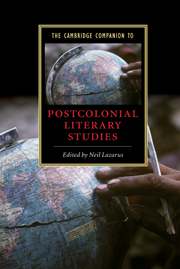Book contents
- Frontmatter
- 1 Introducing postcolonial studies
- Part 1 Social and Historical Context
- Part 2 The Shape of the Field
- 5 Postcolonial literature and the Western literary canon
- 6 Poststructuralism and postcolonial discourse
- 7 From development to globalization: postcolonial studies and globalization theory
- 8 Reading subaltern history
- 9 Temporality and postcolonial critique
- Part 3 Sites of Engagement
- References
- Index
- Series List
7 - From development to globalization: postcolonial studies and globalization theory
from Part 2 - The Shape of the Field
Published online by Cambridge University Press: 28 August 2006
- Frontmatter
- 1 Introducing postcolonial studies
- Part 1 Social and Historical Context
- Part 2 The Shape of the Field
- 5 Postcolonial literature and the Western literary canon
- 6 Poststructuralism and postcolonial discourse
- 7 From development to globalization: postcolonial studies and globalization theory
- 8 Reading subaltern history
- 9 Temporality and postcolonial critique
- Part 3 Sites of Engagement
- References
- Index
- Series List
Summary
Neither “globalization theory” nor “postcolonial studies” are terms that easily reveal their meanings. The areas of knowledge to which they refer are not what they seem, and a great deal of confusion surrounds their uses. Readers would be forgiven for thinking that “globalization theory” denoted an emergent body of writing called forth by inexorable recent developments in technology and communications, as well as radical shifts in the world economy and in geopolitics, all of them presaging the rise of a truly global culture - the obliteration of state sovereignty in a world marked by fluidity and border-crossing. In turn, these readers might suppose that “postcolonial studies” referred to an inaugural critique of Eurocentrism prompted by a new diasporic wave of intellectuals from the former colonies resident in metropolitan centers who - informed by postwar theories of language and representation - began in the late 1970s to cast older versions of “Western Man” in doubt in an act of writing back to Empire.
Actually, neither is the case. One has to begin by distinguishing between the study of global issues or colonial pasts per se and the fairly recent creation of schools of thought that retrospectively appropriate the more general cases fleetingly echoed in their names. When invoked in European or North American universities since the beginning of the 1990s, globalization theory and postcolonial studies turn out to be very specialized discursive formations passing for older and more varied types of enquiry. This slippage between connotation and code is one of the first things to understand about the conjunction of the two terms.
- Type
- Chapter
- Information
- The Cambridge Companion to Postcolonial Literary Studies , pp. 120 - 138Publisher: Cambridge University PressPrint publication year: 2004
- 19
- Cited by



